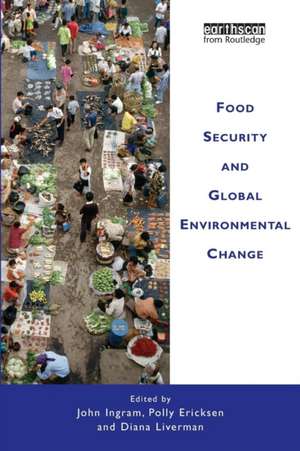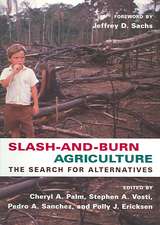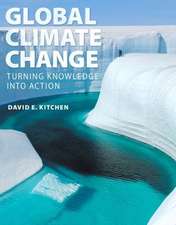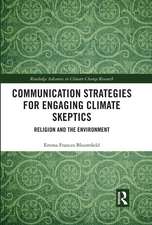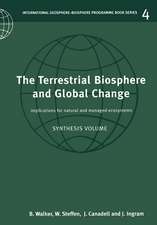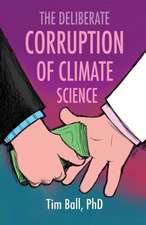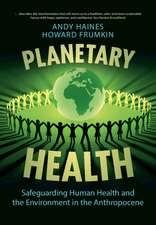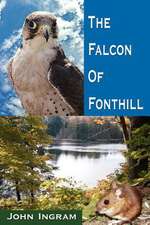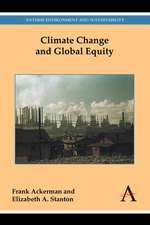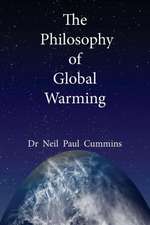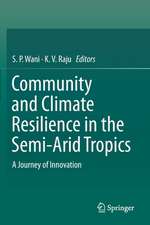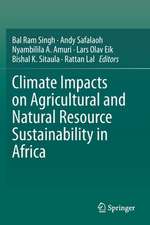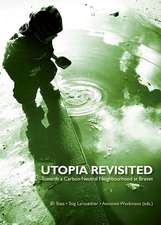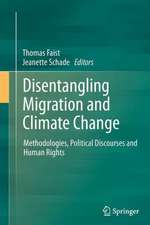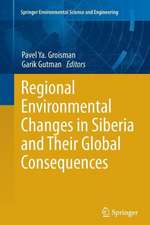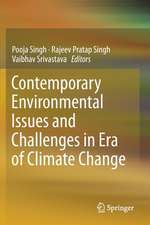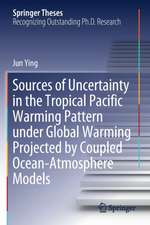Food Security and Global Environmental Change
Autor John Ingram, Polly Ericksen, Diana Livermanen Limba Engleză Paperback – 15 oct 2010
| Toate formatele și edițiile | Preț | Express |
|---|---|---|
| Paperback (1) | 376.48 lei 6-8 săpt. | |
| Taylor & Francis – 15 oct 2010 | 376.48 lei 6-8 săpt. | |
| Hardback (1) | 767.20 lei 6-8 săpt. | |
| Taylor & Francis – 15 oct 2010 | 767.20 lei 6-8 săpt. |
Preț: 376.48 lei
Nou
Puncte Express: 565
Preț estimativ în valută:
72.05€ • 78.23$ • 60.52£
72.05€ • 78.23$ • 60.52£
Carte tipărită la comandă
Livrare economică 22 aprilie-06 mai
Preluare comenzi: 021 569.72.76
Specificații
ISBN-13: 9781849711289
ISBN-10: 1849711283
Pagini: 384
Ilustrații: Line drawings, index
Dimensiuni: 156 x 234 x 33 mm
Greutate: 0.61 kg
Ediția:1
Editura: Taylor & Francis
Colecția Routledge
Locul publicării:Oxford, United Kingdom
ISBN-10: 1849711283
Pagini: 384
Ilustrații: Line drawings, index
Dimensiuni: 156 x 234 x 33 mm
Greutate: 0.61 kg
Ediția:1
Editura: Taylor & Francis
Colecția Routledge
Locul publicării:Oxford, United Kingdom
Cuprins
Preface. Acknowledgements Part 1: Food Security and Global Environmental Change 1. Food Security and the Global Environment: an Overview 2. The Value of the Food Systems Approach 3. Lessons Learned from International Assessments 4. Part I Main Messages Part 2: Vulnerability, Resilience and Adaptation in Food Systems 5. Vulnerability and Resilience of Food Systems 6. What is Vulnerable? 7. Vulnerability to What? 8. Adapting Food Systems 9. Part 2 Main Messages Part 3: Engaging Stakeholders 10. The Science-Policy Interface 11. Engaging Stakeholders at the Regional Level 12. Part 3 Main Messages Part 4: A Regional Approach 13. Why Regions? 14. Stakeholders' Approaches to Regional Food Security Research 15. Undertaking Research at the Regional Level 16. Part 4 Main Messages Part 5: Food Systems in a Changing World 17. Food, Violence and Human Rights 18. Governance Beyond the State: Non-state Actors and Food Systems 19. Green Food Systems for 9 Billion 20. Surprises and Possibilities 21. Part 5 Main Messages 22. Reflection on the Book
Notă biografică
John Ingram is Executive Officer at the Global Environmental Change and Food Systems (GECAFS) International Project Office, Environmental Change Institute (ECI), Oxford University Centre for the Environment, UK.
Polly Ericksen was Science Officer at the Global Environmental Change and Food Systems (GECAFS) International Project Office, Environmental Change Institute (ECI), Oxford University Centre for the Environment, UK. She is now at the International Livestock Research Institute (ILRI), Nairobi, Kenya.
Diana Liverman is Chair of the GECAFS Scientific Advisory Committee, co-director of the Institute of the Environment at the University of Arizona and a Visiting Professor in Environmental Policy and Development in the School of Geography and the Environment at the University of Oxford.
Polly Ericksen was Science Officer at the Global Environmental Change and Food Systems (GECAFS) International Project Office, Environmental Change Institute (ECI), Oxford University Centre for the Environment, UK. She is now at the International Livestock Research Institute (ILRI), Nairobi, Kenya.
Diana Liverman is Chair of the GECAFS Scientific Advisory Committee, co-director of the Institute of the Environment at the University of Arizona and a Visiting Professor in Environmental Policy and Development in the School of Geography and the Environment at the University of Oxford.
Recenzii
'So has the book satisfied its aims and provided scope for an innovative approach which will enable science to underpin a more effective food system? Yes, and if anyone is unsure how to build an innovative approach into their own research, this book is a good place to look for potential answers. Is this a book for policy makers, for researchers or a student text? I believe it is valuable for all three.' - Edwin David Elphinstone in Food Security (2011).
'The enormity of the food security challenge is now widely accepted but there is less agreement on analyses, solutions, emphases and policy directions. We need to fuse action on social, environmental and supply fronts, and to engender change on a scale and with a rapidity which only comes in crises. The urgency of the task is why this weighty collection is so welcome and so important. It is a major contribution to our global policy thinking.' - Tim Lang, City University, UK.
'This book helps us understand the complex linkages between food security and global environmental change. Drawing on detailed case studies from diverse regions, it shows the kind of actions needed to counter food insecurity and ensure investments pay off. Its focus on whole food systems, rather than on agriculture alone, gives it a special place in the literature.' - Bruce Campbell, CGIAR Program 'Climate Change, Agriculture and Food Security', University of Copenhagen, Denmark.
'This book provides an innovative, timely and relevant analysis of food security issues that encourages the reader to think outside the box in both analysis and action. It goes beyond the usual climate change and agriculture discussion and, by combining an inclusive and interdisciplinary approach, it conveys clear messages for policy making at various levels.' - Cheikh Mbow, Universite Cheikh Anta Diop de Dakar-Senegal, Senegal.
'Food security for many is already a critical issue and the situation is getting accentuated further in the context of increasing uncertainties not only from global environmental change but from other factors such as globalization. This volume, therefore, is very timely in bringing together many of the issues determining the links between food security and environment.' - P. S. Ramakrishnan, Jawaharlal Nehru University, India.
'In this impressive volume, John Ingram, Polly Ericksen, Diana Liverman and their colleagues address critical issues associated with transitioning to a more sustainable food future. Their analysis of the complex interactions between food security and dynamic drivers of global environmental change is both conceptually and methodologically sophisticated. They apply an innovative synthetic framework to a set of fascinating, empirically rich, regional case studies and draw important conclusions for both food and climate science policy and practice. Their book highlights the need to identify and pursue multiple pathways at a range of levels on different scales to achieve greater synergy between improved food security and sustainable environmental outcomes.' - John Thompson, Institute of Development Studies, UK.
'I found the book incredibly enjoyable and thought provoking to read, with its mixture of inputs from a range of social and natural scientists. The importance of an integrated approach to Food Security is clear, and this volume beautifully provides just that, with the social science contributions written so that people from different specialist areas can understand the concepts and arguments. This seems equally true for the natural science contributors. The book is superbly structured and edited: the reader is led from one chapter to the next and through the five parts of the book exceptionally well.' - Edwin David Elphinstone, Food Security
If anyone is unsure how to build an innovative approach into their own research, this book is a good place to look for potential answers. Is this a book for policy makers, for researchers or a student text? I believe it is valuable for all three. - Edwin David Elphinstone, Food Security
"Overall this edited collection makes important conceptual and methodological contributions to the ever-expanding body of scholarship that investigates the links between food security and GEC." - Beth Bee, Pennsylvania State University
"Can decision-makers and policy-makers be bothered to read this? They should." - S. B. Agrawal, International Journal of Environmental Studies
'The enormity of the food security challenge is now widely accepted but there is less agreement on analyses, solutions, emphases and policy directions. We need to fuse action on social, environmental and supply fronts, and to engender change on a scale and with a rapidity which only comes in crises. The urgency of the task is why this weighty collection is so welcome and so important. It is a major contribution to our global policy thinking.' - Tim Lang, City University, UK.
'This book helps us understand the complex linkages between food security and global environmental change. Drawing on detailed case studies from diverse regions, it shows the kind of actions needed to counter food insecurity and ensure investments pay off. Its focus on whole food systems, rather than on agriculture alone, gives it a special place in the literature.' - Bruce Campbell, CGIAR Program 'Climate Change, Agriculture and Food Security', University of Copenhagen, Denmark.
'This book provides an innovative, timely and relevant analysis of food security issues that encourages the reader to think outside the box in both analysis and action. It goes beyond the usual climate change and agriculture discussion and, by combining an inclusive and interdisciplinary approach, it conveys clear messages for policy making at various levels.' - Cheikh Mbow, Universite Cheikh Anta Diop de Dakar-Senegal, Senegal.
'Food security for many is already a critical issue and the situation is getting accentuated further in the context of increasing uncertainties not only from global environmental change but from other factors such as globalization. This volume, therefore, is very timely in bringing together many of the issues determining the links between food security and environment.' - P. S. Ramakrishnan, Jawaharlal Nehru University, India.
'In this impressive volume, John Ingram, Polly Ericksen, Diana Liverman and their colleagues address critical issues associated with transitioning to a more sustainable food future. Their analysis of the complex interactions between food security and dynamic drivers of global environmental change is both conceptually and methodologically sophisticated. They apply an innovative synthetic framework to a set of fascinating, empirically rich, regional case studies and draw important conclusions for both food and climate science policy and practice. Their book highlights the need to identify and pursue multiple pathways at a range of levels on different scales to achieve greater synergy between improved food security and sustainable environmental outcomes.' - John Thompson, Institute of Development Studies, UK.
'I found the book incredibly enjoyable and thought provoking to read, with its mixture of inputs from a range of social and natural scientists. The importance of an integrated approach to Food Security is clear, and this volume beautifully provides just that, with the social science contributions written so that people from different specialist areas can understand the concepts and arguments. This seems equally true for the natural science contributors. The book is superbly structured and edited: the reader is led from one chapter to the next and through the five parts of the book exceptionally well.' - Edwin David Elphinstone, Food Security
If anyone is unsure how to build an innovative approach into their own research, this book is a good place to look for potential answers. Is this a book for policy makers, for researchers or a student text? I believe it is valuable for all three. - Edwin David Elphinstone, Food Security
"Overall this edited collection makes important conceptual and methodological contributions to the ever-expanding body of scholarship that investigates the links between food security and GEC." - Beth Bee, Pennsylvania State University
"Can decision-makers and policy-makers be bothered to read this? They should." - S. B. Agrawal, International Journal of Environmental Studies
